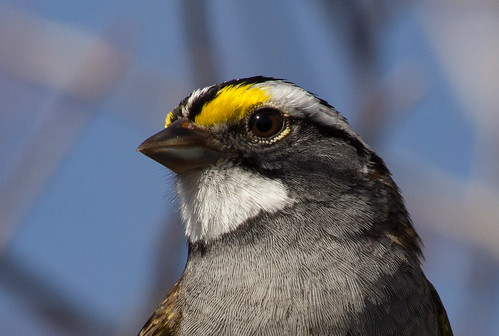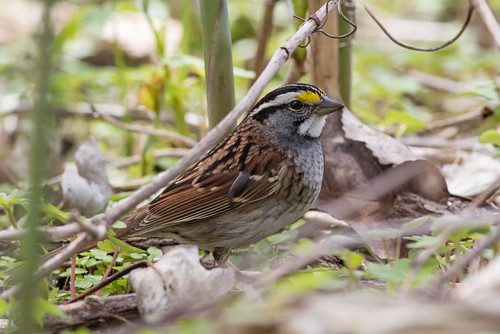I pride myself on knowing a lot about birds. But as I learned long ago, what I know is always subject to change. Last week, the summary of a paper being published in the August 17, 2020 issue of Current Biology was previewed by several news sources, and suddenly my inbox was inundated with people sending me links to the story, about how White-throated Sparrows are singing a different song now, one that apparently started in western Canada and has spread far more quickly than it could by any means except that birds are apparently learning the new tune on their southern wintering grounds, where eastern birds mix with western ones. This turns a lot of what I thought I knew on its head.
The White-throated Sparrow song I’ve loved for so long is described as following the rhythm Old Sam Peabody, Peabody, Peabody. People north of the border learn it the way E.B.White memorialized it in his lovely book, The Trumpet of the Swan, Oh, sweet Canada, Canada, Canada!
By the time White wrote the book in 1970, neither mnemonic was exactly accurate: Instead of two steady notes to begin the song (the “Old Sam” or “Oh, sweet), birds had since the 1960s started singing three or four introductory notes. Some people adjusted the mnemonic to Poor old Sam Peabody, Peabody, Peabody, which is how the song sounded when I started birding in 1975. Whether you adjusted the mnemonic or not, it still clearly and accurately highlighted the series of triplet notes that are what have stood out for so very long for so many of us.
In 2010, when the Birds of North America entry for the White-throated Sparrow was updated by Falls and Kopachena, the authors mentioned a personal communication from Scott Ramsay that “The triplets are replaced by doublets in central British Columbia.” That sounded like the kind of intriguing local dialect sort of thing limited to one location. Indeed, the very first sentence in the new Current Biology paper is:
Hypotheses on regional song variation (“dialects”) assume that dialects remain stable within regions, are distinct between regions, and persist within populations over extensive periods.
But the variation ending in doublets turned out to be spreading beyond British Columbia. The paper says:
…doublet-ending songs emerged and replaced triplet-ending songs west of the Rocky Mountains sometime between 1960 and 2000 and appeared just east of the Rockies in the 2000s. From recordings collected over two decades across North America, we show that doublet-ending song has now spread at a continental scale.
Scientists long understood that White-throated Sparrows learn their song from their father and neighboring White-throats before their first migration. White-throats in general return to the area where they hatched, so if learning the song locally were true, the songs in any given location would remain fairly stable from year to year and decade to decade, but White-throated Sparrows are breaking that fundamental rule about local dialects.
In the way that radio, TV, and now social media foster the rapid spread of new songs, and soften the extremes of local dialects, White-throated Sparrows are picking up important elements of their song while mingling with White-throats from all over on their wintering grounds. The authors used geolocators to establish that the eastern and western populations mix in winter.
Of course, when birds with the variant first appeared, they were mingling with plenty of birds singing the traditional song. So what drove so many birds to switch to the new version? Some recent research suggests that young male birds of several species are likely to pick out novel variants of a song over the way they learned it at home, rather like the way college students pick up cultural elements different from what they grew up with. When selecting a mate, female White-throated Sparrows may prefer the cutting-edge new song elements, hastening the faddish song’s spread.
Researchers have been studying and recording White-throated Sparrows every year since the 1950s at Algonquin Provincial Park in Ontario. As the authors of the new study went through recordings collected over those years, they discovered that the very first bird singing the doublet song in the park was recorded in 2005; he was the only one out of 76 recorded males not singing the triplets. In 2007, 2009, and 2010, fewer than 5 percent of males were singing the new song, but more than 10 percent were singing it in 2012 and 2013. In 2014, it jumped to 21.8 percent of 101 males, and nearly half of the 92 males recorded in 2017 were singing it in Algonquin Park. Apparently the new song has completely taken over in Wisconsin and Minnesota.
This is the year I started recording my backyard birds every non-rainy morning. We didn’t have a big sparrow migration, but I did get some White-throated Sparrow recordings.
When I was listening to them back in April and early May, I was disappointed that I didn’t get any normal songs—the ones ending with the triplets. It never occurred to me that the birds had changed their tune—I figured I’d missed the main migration of males and was getting just female singers or something. Now in the coming weeks I’ll have to go through some of my recordings from earlier decades to see if I even have any good ones with the triplets. I was already deeply regretting not starting to record my backyard birds decades ago, and now I really wish I had. Oh, well. Live and learn.

